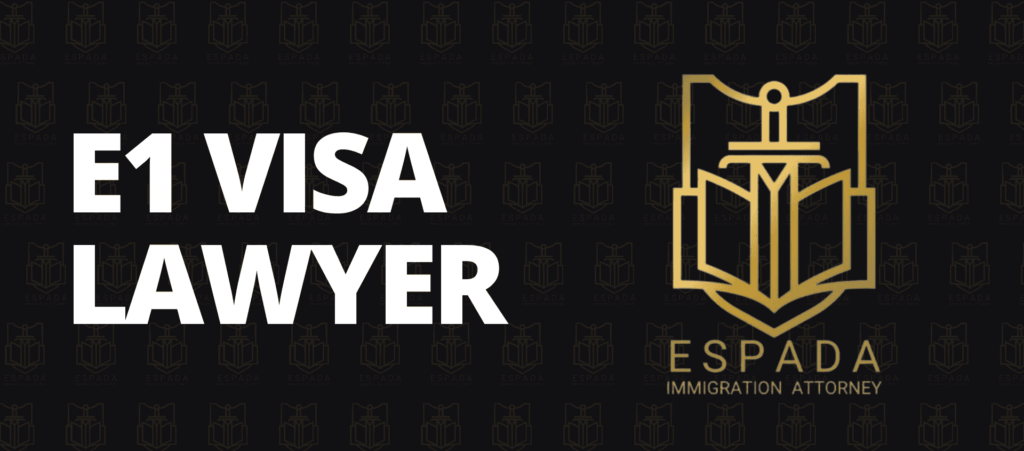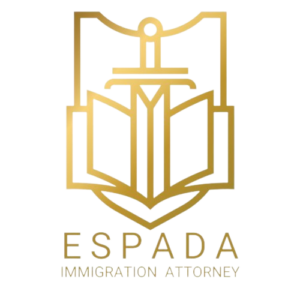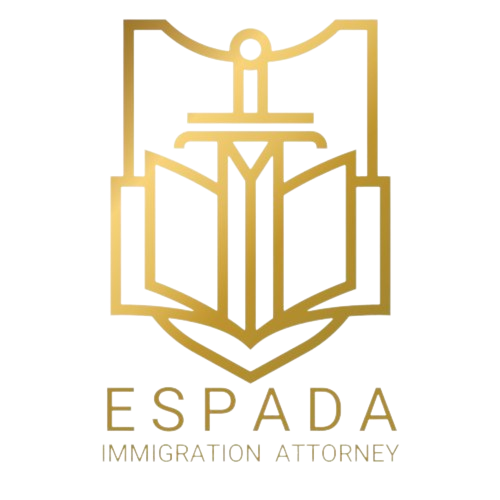E1 Visa Guide: All You Need to Know About the E1 Visa

The E1 visa is a specialized visa for business professionals from select treaty countries. It enables individuals to work in the U.S. and engage in substantial trade activities between the United States and their home country.
This guide will cover key aspects of the E1 visa. For any questions, please feel free to email me directly at abbas@espadaimmigration.com. I respond promptly to emails and am happy to assist you.
Overview:
- What is the E1 Visa?
- Benefits of the E1 Visa
- Requirements for the E1 Visa
- E1 Visa Process
- Required Documents for the E1 Visa
- E1 Visa Fees
- E1 Visa Processing Time
- E1 Extension
- Conclusion
1. What is the E1 Visa?
The E1 visa is a unique visa designed for business professionals from specific “treaty countries.” It permits individuals to work in the U.S. and engage in significant trade between entities in the United States and their home country. This trade can span various industries, including transportation, communication, banking, advertising, and management.
2.What are the benefits of the E1 Visa?
The E1 Visa offers numerous advantages, including:
- The ability to legally work in the United States.
- Freedom to travel in and out of the U.S. without restrictions.
- Option for indefinite renewals, with extensions granted for up to two years each time.
- Eligibility for spouses and dependent children (unmarried and under 21) to obtain E1 status as well. Children can attend school, and spouses can apply for employment authorization through an Employment Authorization Document (EAD).
3. What are the requirements to get the E1 Visa?
To be eligible for the E1 visa, several requirements must be met:
You must be a citizen of a country that has a treaty of commerce and navigation with the United States.
The E1 visa is available only to citizens of certain countries that have treaties with the United States. Eligible countries include Argentina, Australia, Austria, Belgium, Bolivia, Bosnia and Herzegovina, Canada, Chile, China (Taiwan), Colombia, Costa Rica, Croatia, Denmark, Estonia, Ethiopia, Finland, France, Germany, Honduras, Iran, Ireland, Israel, Italy, Japan, Jordan, South Korea, Kosovo, Latvia, Liberia, Luxembourg, Macedonia, Mexico, Montenegro, Netherlands, Norway, Oman, Pakistan, Philippines, Serbia, Singapore, Slovenia, Spain, Suriname, Sweden, Switzerland, Thailand, Togo, Turkey, and the United Kingdom.
If the treaty trader is a business rather than an individual, at least 50% of the business must be owned by nationals of the treaty country, and only employees from that country are eligible for the E1 visa. There are two exceptions:
If the business is equally owned by nationals of two treaty countries, it is considered a joint venture, making nationals of both countries eligible for an E1 visa.
In certain cases, the treaty extends to territories or possessions beyond the treaty country (such as certain territories of the United Kingdom), allowing residents of these locations to qualify for the E1 visa.
- The work you perform must qualify as “trade.” To qualify for an E1 visa, the individual’s work must involve trade. The U.S. Department of State defines trade as having three key elements:
(1) a “substantial” exchange
(2) international scope, and
(3) a qualifying trade item, which can include goods, services, or funds.
Furthermore, there must already be an established trade relationship between the applicant (or their entity) and the United States. - Substantial Trade:
To be eligible for an E1 visa, the trade activity must be deemed substantial. Substantial trade refers to a level of trade that “ensures a continuous flow” between the United States and the treaty country. Consular officers evaluating E1 visa applications prioritize the frequency of transactions over the total monetary value. - Principal Trade Partner:
To meet the requirement for trade to be primarily between the U.S. and the treaty country, at least 50% of the treaty trader’s total international trade volume must involve the U.S. and the treaty country. - Essential Role:
To qualify for an E1 visa, you must share the same nationality as the principal employer and provide proof of legal employment. Additionally, you need valid evidence demonstrating your essential role in the company’s operations. This may involve showing that you are a supervisor, manager, or executive, or that you possess unique qualifications essential for the company’s efficient functioning. - You must provide evidence that you plan on departing the US following the termination of your E1 visa status.
While you don’t need to show proof of maintaining property abroad, you must demonstrate an intent to depart the United States once your E1 visa status ends. This intent can be shown through a formal declaration.
4. E1 Visa Process
The E1 visa application involves several steps, and an immigration attorney can guide you through this process. You can apply for an E1 visa either from within the U.S. through USCIS or from a U.S. consulate abroad. Regardless of the application location, the following documents are typically required:
- Form G-28
This Notice of Entry of Appearance form is completed by your attorney or accredited representative, allowing them to act on your behalf. - Passport
Either a current passport or a copy of its biographic page. - Proof of E1 Eligibility
Evidence demonstrating that you meet the criteria for E1 status. - Business Information
Documentation about the business, including its industry, scope, and ownership structure. - U.S. Company Support Statement
A letter from your U.S. employer explaining the importance of your role for the company’s operations. - Intent to Depart
Evidence showing your intention to leave the U.S. once your E1 status ends.
Applying for an E1 Visa
If you are outside the U.S., you will need to apply for an E1 visa at a consulate or embassy in your country. It is advisable to work with an experienced immigration attorney to gather and prepare all necessary documentation for your application. Keep in mind that different consulates may have varying requirements regarding the types of documents needed and how they should be organized and presented. Therefore, it’s important to check the specific consulate’s website to ensure your application is properly submitted. Additionally, most consulates do not accept applications from third country nationals, so you will likely need to apply through your home country’s consulate.
Once you have compiled all required documents, your attorney will assist you in completing Form DS-160, the Online Nonimmigrant Visa Application. This form provides essential information that helps consular officers determine your eligibility for a nonimmigrant visa, including the E1 visa.
Your attorney will also fill out Form DS-165E, the Nonimmigrant Treaty Trader/Investor Application, which requires information about both yourself and your company. This form further assists consular officers in evaluating your application for an E1 visa.
After completing the application and gathering all supporting documents, your attorney will submit your E1 visa application directly to the consulate.
Next, you will need to schedule a personal interview with a consular officer. Your attorney should prepare you for what to expect during this visa interview.
During the interview, you may be asked various questions regarding your E1 business, personal background, and immigration plans. If the interview goes well, your E1 visa should be stamped in your passport within a few days.
With the E1 visa, you will be allowed to enter the United States under the terms of the visa. Upon entry, you will receive E1 status.
Change of Status
If you are currently in the United States on a valid non-immigrant status and have maintained continuous non-immigrant status, you may be eligible to apply for a change of status to E1 status. This process involves filing a change of status petition with USCIS.
It is advisable to work closely with an experienced immigration attorney to navigate this process. Your attorney will assist you in gathering all the necessary documentation required for the change of status application.
Your attorney will also complete Form I-129, which is the Petition for a Nonimmigrant Worker. Additionally, you will need to fill out the E-supplement associated with this form.
You might also consider filing Form I-907, which is a Request for Premium Processing Services. This form allows you to request expedited processing for your application.
Once all the documents are assembled and the forms are completed, your attorney will submit the application to USCIS, including a copy of the biographic page of your passport and your I-94 card.
Upon approval of your change of status, you will be granted E1 status. It’s important to note that this is not a visa; instead, you will receive a new I-94 that reflects your E1 status and indicates the duration of your validity.
The entire change of status process occurs while you remain in the U.S.
5. Required Documents for the E1 Visa
The E1 visa application process may require various documents. Below is a list of some common documents that could be necessary. Keep in mind that this is a general list, and the specific requirements may vary depending on individual circumstances. Consulting with an immigration attorney can help you identify the exact documents needed for your situation.
Proof of Business Ownership and Nationality: This may include documents such as Articles of Incorporation, Articles of Organization, ownership certificates, Annual Reports, stock exchange listings, or a statement from a certified accountant.
Evidence of Substantial Trade: Supporting documents can include contracts, receipts, inventories, financial statements, and copies of business plans.
Proof of Intent to Return Home: Documentation may consist of a property deed, a signed statement, or evidence of plans in your home country following the end of your E1 visa status.
Form DS-160: Online Nonimmigrant Visa Application.
Form DS-165E: Nonimmigrant Treaty Trader/Investor Application.
Form I-129: Petition for a Nonimmigrant Worker.
Form I-907: Request for Premium Processing Services.
Form G-28: Notice of Entry of Appearance as Attorney or Accredited Representative.
Valid Passport: Or a copy of the biographic page of your passport.
I-94 Card: Record of your arrival and departure in the U.S.
Visa Photo: A valid photo that meets visa requirements.
Fee Payment Receipts: Documentation showing payment of application fees.
Visa Appointment Letter: Confirmation of your visa interview appointment.
Letter from Employer: A statement from your employer explaining your role and the necessity of your position.
6. E1 Visa Fees
Fees include a $205 application fee for the visa. For changes of status, filing Form I-129 costs $460, with an optional $1,440 for premium processing. If you have dependents, an additional fee of $370 applies.
7. E1 Visa Processing Time
Processing times vary. Generally, it takes 2-3 months for an E1 visa application at a consulate. For changes of status within the U.S., it can take 6-8 months. Premium processing can expedite the timeline to 15 days.
8. E1 Extension
The E1 visa is valid for two years, but there is no limit on the number of extensions you can request. To apply for an extension of your status, you may need to submit the following forms to USCIS:
Form I-129: This is the Petition for a Nonimmigrant Worker, which allows a foreign national to work temporarily in the United States.
Form I-539: Known as the Application to Extend/Change Nonimmigrant Status, this form is used to request an extension of E1 status for your dependents.
It’s important to note that if there are changes in your employment duties, ownership of the company, or if your employment ends, you must update your documentation accordingly. Under the E1 visa, treaty traders can only engage in the specific activities for which they were initially approved.
E1 visa holders may also work for the parent company or subsidiaries of the treaty organization, provided there is a recognized relationship and the position requires executive, supervisory, or specialized skills.
If you have questions about your E1 options or need assistance, I or a member of my team would be glad to help.
9. Conclusion
The E1 visa is a valuable option for business professionals from treaty countries who wish to conduct substantial trade with the U.S. This guide covers the E1 visa’s benefits, requirements, and process.
If you have further questions, please reach out to me directly at abbas@espadaimmigration.com. I’m happy to help you understand the E1 visa and how it applies to your situation.
Resources:
- Business Immigration Law & Practice: Second Edition
- US Citizenship and Immigration Services
- US Department of State
Why Choose Us
Choosing the right immigration lawyer can make all the difference in achieving your U.S. immigration goals. At Espada Immigration Lawyer, we are dedicated to providing exceptional legal guidance and personalized support through every step of the process. Our team combines specialized expertise, transparency, and an unwavering commitment to client success, making us a trusted partner for all your immigration needs.
- Specialized Expertise
- Personalized Approach
- Transparent Guidance
- Client-Centered Commitment

DISCLAIMER: This article is provided for general informational purposes only and does not constitute legal advice. The information herein should not be interpreted as formal legal counsel nor does it establish an attorney-client relationship. This article is neither intended as a solicitation for legal services nor as a substitute for individual legal advice. For specific legal guidance, please consult an attorney in your jurisdiction. Actions based on information in this article are taken at your own risk, and I disclaim any liability for such actions. Please note that information may have changed since publication and may no longer be current. This article does not offer guarantees, warranties, or predictions regarding the outcome of any legal matters. Each case is unique, and results will depend on individual facts and legal issues. Thank you.
ATTORNEY ADVERTISING: Any invitation to contact our law firm on this website and related pages constitutes attorney advertising.
